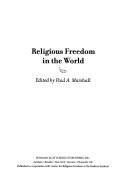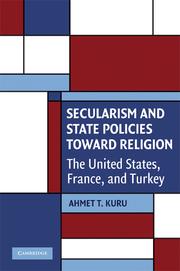| Listing 1 - 3 of 3 |
Sort by
|

ISBN: 9780742562127 Year: 2008 Publisher: Lanham Rowman & Littlefield Publishers, Inc.
Abstract | Keywords | Export | Availability | Bookmark
 Loading...
Loading...Choose an application
- Reference Manager
- EndNote
- RefWorks (Direct export to RefWorks)
religion --- religious freedom --- religious persecution --- government and religion --- regulation of religion
Book
ISBN: 9780198712190 9780198569633 0198569637 9780198712190 9780198713944 0198713940 9780191021008 0191021008 0198712197 0199595356 9780199595358 Year: 2014 Publisher: Oxford: Oxford university press,
Abstract | Keywords | Export | Availability | Bookmark
 Loading...
Loading...Choose an application
- Reference Manager
- EndNote
- RefWorks (Direct export to RefWorks)
The Union seeks to balance its predominantly Christian religious heritage with an equally strong secular and humanist by facilitating religion as a form of cultural identity while simultaneously limiting its political influence. Such balancing takes place in the context of the Union's limited legitimacy and its commitment to respect for Member State cultural autonomy. Deference towards the cultural role of religion at Member State level enables culturally-entrenched religions to exercise a greater degree of influence within the Union's public order than "outsider" faiths that lack a comparable cultural role. Placing the Union's approach to religion in the context of broader historical and sociological trends around religion in Europe and of contemporary debates around secularism, equaltreatment, and the role of Islam in Europe, McCrea sheds light on the interaction between religion and EU law in the face of a shifting religious demographic.
Emotions --- Affect (Psychology) --- Affective neuroscience --- Affect (Psychologie) --- Neuroscience affective --- Affect --- Experimentele psychologie --- English --- Motivatie en emotie. --- emoties --- psychologie, sociaal --- woordenboek --- Feelings --- Human emotions --- Passions --- Psychology --- Apathy --- Pathognomy --- Neurobiology of emotion --- Neuroscience of emotions --- Physiology of emotion --- Neuropsychology --- Church and state --- Freedom of religion --- Religion and law --- Eglise et Etat --- Liberté religieuse --- Religion et droit --- Europe --- religious inheritance --- religion --- law --- identity --- the public order --- the European Union --- fundamental rights --- the regulation of religion

ISBN: 9780521517805 9780521741347 9780511815096 0521741343 052151780X 9780511650475 0511650477 9780511533709 0511533705 0511815093 1107191459 0511532792 0511531885 9781107191457 9780511532795 9780511531880 Year: 2009 Publisher: Cambridge ; New York : Cambridge University Press,
Abstract | Keywords | Export | Availability | Bookmark
 Loading...
Loading...Choose an application
- Reference Manager
- EndNote
- RefWorks (Direct export to RefWorks)
Why do secular states pursue different policies toward religion? This book provides a generalizable argument about the impact of ideological struggles on the public policy making process, as well as a state-religion regimes index of 197 countries. More specifically, it analyzes why American state policies are largely tolerant of religion, whereas French and Turkish policies generally prohibit its public visibility, as seen in their bans on Muslim headscarves. In the United States, the dominant ideology is 'passive secularism', which requires the state to play a passive role, by allowing public visibility of religion. Dominant ideology in France and Turkey is 'assertive secularism', which demands that the state play an assertive role in excluding religion from the public sphere. Passive and assertive secularism became dominant in these cases through certain historical processes, particularly the presence or absence of an ancien régime based on the marriage between monarchy and hegemonic religion during state-building periods.
Religion and state --- Religion and state. --- Political philosophy. Social philosophy --- Religious studies --- United States --- Turkey --- Religion et Etat --- France --- 261.7 --- 261.7 De Kerk en de burgerlijke macht: Kerk en Staat; godsdienstvrijheid; verdraagzaamheid; tolerantie:--theologische aspecten --- De Kerk en de burgerlijke macht: Kerk en Staat; godsdienstvrijheid; verdraagzaamheid; tolerantie:--theologische aspecten --- State and religion --- State, The --- Religious aspects --- Social Sciences --- Sociology --- secularism --- state policy toward religion --- state regulation of religion --- religious leaders --- authoritarian government --- religious expression --- democracy --- separatist secularism
| Listing 1 - 3 of 3 |
Sort by
|

 Search
Search Feedback
Feedback About UniCat
About UniCat  Help
Help News
News